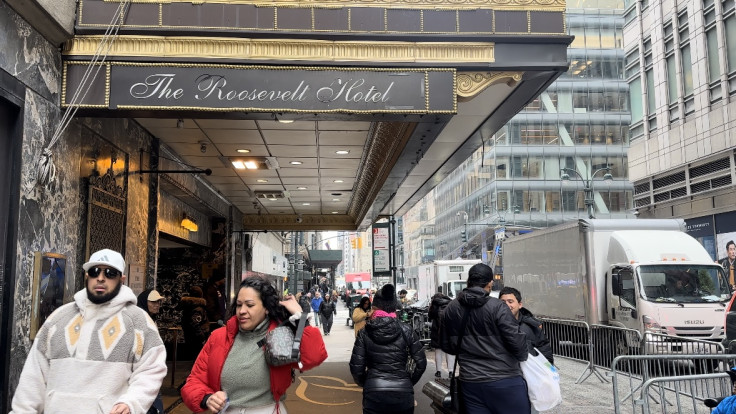
NEW YORK CITY — At the back of The Roosevelt Hotel in Midtown, the city's Asylum Seeker Resource Navigation Center, families line up with their eviction notice in hand and their entire lives packed up in plastic bags and carts. They've been evicted from their shelter placements and must re-check in at the hotel to be sheltered somewhere else for the next 60 days.
New York City continues to to grapple with an ever-increasing influx of migrants. Almost 170,000 have arrived since mid 2022, overcrowding and overwhelming the city's emergency shelter system.
As part of its effort to alleviate the city's system and resources, the Eric Adams administration imposed shelter stay limits: concretely, single adult migrants have 30 days to stay in a shelter, while families with children have 60 days. Once their time is up they are evicted and have to reapply for shelter housing — placements in the same hotel aren't guaranteed.
However, the policy has been met with opposition, as advocates say this would disrupt the stability migrants came to New York looking for.
"Forcing families with children who have already endured unthinkable suffering on their journey to New York – trauma the Mayor reportedly saw with his own eyes when he visited the Darién Gap – to be denied safe shelter after 60 days is devoid of any humanity and is a stain on our city's long-standing reputation as a welcoming home for all," said advocates from the The Legal Aid Society and the Coalition for the Homeless in a statement.
One illustrating case is that of Fausto Toaquiza, who came to the city with his wife and their three-year-old son from Ecuador two months ago. The shelters have helped him gained some stability in an unknown country.
"When you come, you don't have a single coin in your pocket," he told The Latin Times. "[The shelters] have been of great help. They've given us food for my son, for us. They've treated us well, they have given us everything we need."
Toaquiza left Ecuador after his wife's fruit stand fell victim to the vacunas — a term used to describe the moment when businesses are robbed and extorted in exchanged for "protection" by local gangs. The journey north took them two and a half months.
Upon arriving to New York City his goal was to work his way out of the shelter, but finding a job without a work permit is next to impossible. After submitting his asylum application, Toaquiza saw a glimmer of hope when his and his wife's work permit finally arrived. They both began working at a McDonald's in Times Square.
They hope to use that money to save up and move out of the shelter and into an apartment, but rent prices are skyrocketing and its hard to find a place that accepts their toddler.
"Its been difficult. They don't want to accept kids, they see a kid and they say 'no,'" said Toaquiza.
The shelter has been his only hope, but as he lined up outside the Roosevelt Hotel, he had no idea if he and his family would have a bed to sleep in that day. He still needs more time at a shelter to build up a life in the city from scratch.
"I don't know [if I will get placed] its my first time coming here, and I will have to wait and see," he Toaquiza said. "I'm hoping to stay in the shelter for two more months. After that I'll see if I'm in a stable enough position to get an apartment."
"[Coming to New York] has been with it," he said. "We have to keep going no matter what get thrown our way even it wasn't worth it."
© 2025 Latin Times. All rights reserved. Do not reproduce without permission.





